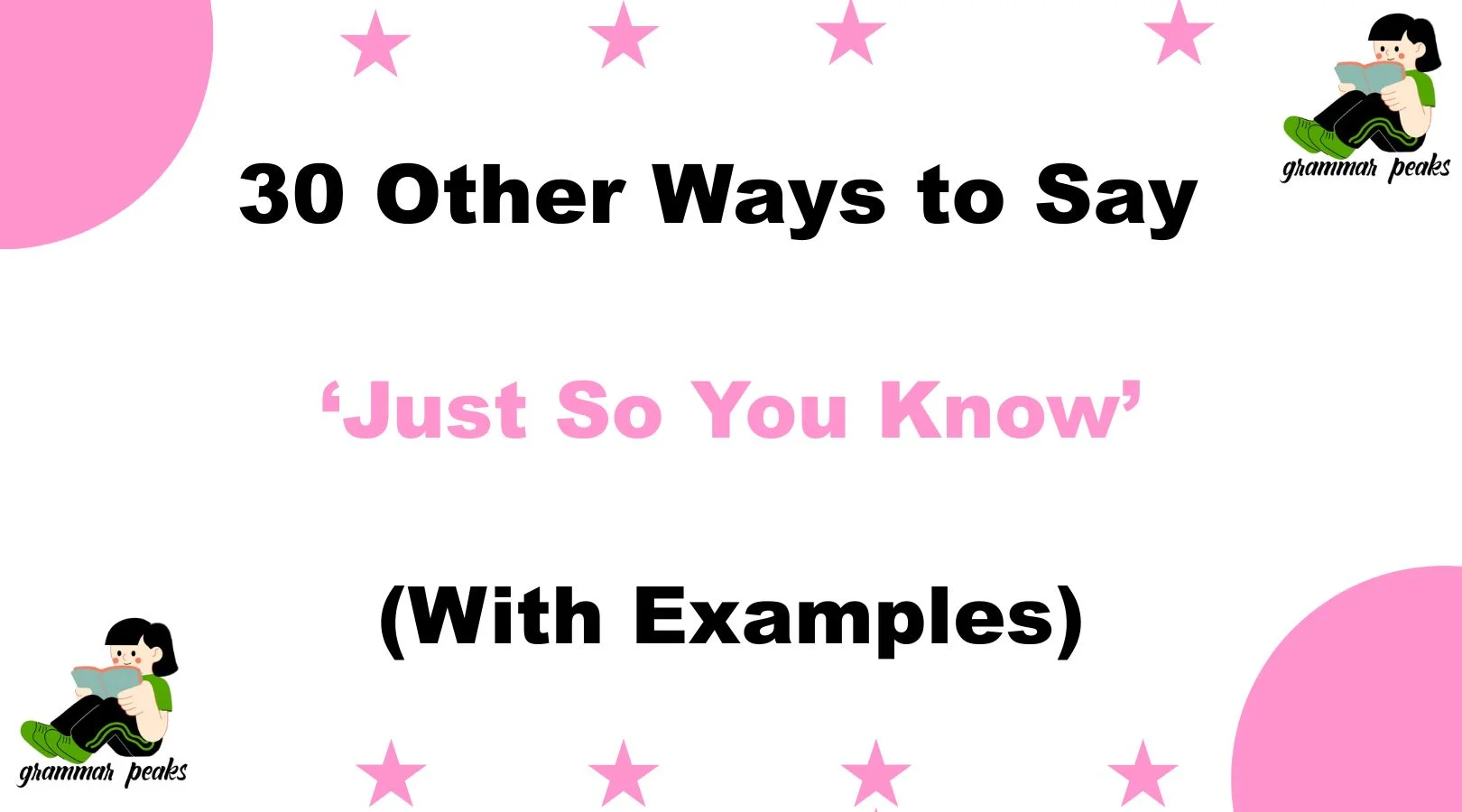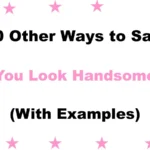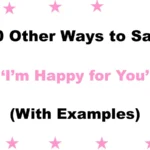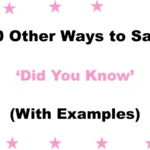Finding the right words to express yourself with warmth and care can make all the difference in how your message is received. Instead of the usual phrase “just so you know,” you can use alternative expressions that sound more thoughtful, personal, or professional depending on the situation.
These alternatives help you communicate clearly and kindly, showing your listener or reader that you value their understanding. Whether you want to share information gently, emphasize transparency, or soften the delivery of news, having a variety of ways to say this simple phrase can boost your communication skills and deepen connections.
What Does “Just So You Know” Mean?
“Just so you know” is a casual phrase used to introduce information that might be important, helpful, or relevant to someone. It’s often shared to keep someone in the loop without sounding too direct or demanding. While the phrase seems friendly, it can sometimes carry an unexpected tone depending on how it’s said.
For example, in a text or conversation, it might feel neutral and informative—or it could come across as slightly passive if not framed with care. That’s why exploring alternative phrases can help you express yourself with more warmth, clarity, and intention.
When to Use “Just So You Know”
You can use “just so you know” when you want to:
- Share helpful information
- Give a heads-up or warning
- Clarify details without sounding too formal
- Show consideration by informing someone in advance
Is It Professional/Polite to Say “Just So You Know”?
“Just so you know” can be polite in casual or conversational settings, but it isn’t always the best choice in professional communication. While it’s generally meant to be helpful, it can occasionally come across as passive-aggressive or dismissive—especially in emails or formal discussions.
In workplace settings, it’s often better to use more polished alternatives like “For your awareness” or “I wanted to let you know” to keep the tone respectful and clear. Ultimately, the professionalism of this phrase depends on your relationship with the person and the context in which it’s used.
Pros and Cons of Using “Just So You Know”
Pros:
- Easy to understand
- Friendly and casual
- Prepares listener for important info
Cons:
- Can sound too informal in professional settings
- Sometimes perceived as a subtle warning or criticism
- May not fully convey warmth or empathy
Synonyms for “Just So You Know”
- For your information
- I want to let you know
- It’s worth mentioning
- In case you weren’t aware
- To keep you informed
- As a heads-up
- I thought you should know
- For your awareness
- Just a quick note
- To bring to your attention
- By the way
- I want to point out
- As a reminder
- So you’re aware
- Let me inform you
- I want to share with you
- To make you aware
- Just a friendly note
- In the interest of transparency
- For your consideration
- Just to mention
- Just a heads-up
- To flag something for you
- A quick FYI
- I want to highlight
- Just so it’s clear
- To ensure you know
- So you’re in the loop
- To update you
- For clarity
1. For Your Information
Definition: A formal way to share information that might be important or helpful.
Explanation: This phrase is often used in professional or formal contexts to introduce facts or updates.
Scenario Example: For your information, the meeting has been rescheduled to next Tuesday.
Best Use: When you want to share information politely and clearly, especially in emails or reports.
Worst Use: Avoid in very casual conversations, as it can sound stiff or overly formal.
Tone: Polite, formal, informative.
2. I Want to Let You Know
Definition: A warm and direct way to share something important.
Explanation: Shows a personal intention to keep the listener informed.
Scenario Example: I want to let you know that your package will arrive tomorrow.
Best Use: When you want to show care and attentiveness.
Worst Use: Could sound too direct if the news is negative without softening.
Tone: Caring, personal, clear.
3. It’s Worth Mentioning
Definition: Used to introduce information that may be helpful or relevant.
Explanation: Suggests the info is valuable for the listener to consider.
Scenario Example: It’s worth mentioning that the prices will increase next month.
Best Use: When highlighting important details.
Worst Use: Overusing can dilute impact.
Tone: Informative, thoughtful.
4. In Case You Weren’t Aware
Definition: A gentle way to provide new information.
Explanation: Implies you’re filling in a gap in knowledge without sounding critical.
Scenario Example: In case you weren’t aware, the office will be closed on Friday.
Best Use: When sharing updates without blaming or judging.
Worst Use: Can sound slightly condescending if not careful.
Tone: Gentle, helpful.
5. To Keep You Informed
Definition: A phrase emphasizing ongoing communication.
Explanation: Shows you value transparency and want to keep the listener updated.
Scenario Example: To keep you informed, the project deadline has been extended.
Best Use: In ongoing professional or personal communications.
Worst Use: Might be too formal for casual chats.
Tone: Transparent, respectful.
6. As a Heads-Up
Definition: Informal way to warn or prepare someone.
Explanation: Indicates the information is a caution or early notice.
Scenario Example: As a heads-up, the traffic might be heavy after 5 PM.
Best Use: Casual or friendly conversations.
Worst Use: Avoid in very formal contexts.
Tone: Casual, friendly.
7. I Thought You Should Know
Definition: A phrase that shows you care about sharing important info.
Explanation: Implies consideration for the listener’s needs.
Scenario Example: I thought you should know the software update might cause delays.
Best Use: When sharing news that affects the listener.
Worst Use: Can sound passive-aggressive if the tone isn’t warm.
Tone: Considerate, direct.
8. For Your Awareness
Definition: A formal phrase to draw attention to something.
Explanation: Focuses on making the listener consciously aware.
Scenario Example: For your awareness, new safety protocols are in place.
Best Use: Professional emails or notices.
Worst Use: Too formal for everyday chats.
Tone: Formal, informative.
9. Just a Quick Note
Definition: Informal phrase to introduce a brief message.
Explanation: Signals a short, friendly update.
Scenario Example: Just a quick note to remind you about tomorrow’s event.
Best Use: Casual emails or texts.
Worst Use: Avoid serious or lengthy updates.
Tone: Friendly, informal.
10. To Bring to Your Attention
Definition: Formal phrase to highlight important info.
Explanation: Used when you want the listener to focus on something specific.
Scenario Example: To bring to your attention, the report contains several errors.
Best Use: Professional or serious discussions.
Worst Use: Can sound accusatory if overused.
Tone: Formal, direct.
11. By the Way
Definition: Casual phrase to add extra info.
Explanation: Introduces an additional thought or reminder.
Scenario Example: By the way, don’t forget to submit your timesheet.
Best Use: Informal conversations.
Worst Use: Not ideal for serious matters.
Tone: Casual, friendly.
12. I Want to Point Out
Definition: Direct phrase to highlight something important.
Explanation: Used to emphasize a specific detail.
Scenario Example: I want to point out that the deadline is tomorrow.
Best Use: When clarity is essential.
Worst Use: Can sound blunt if time isn’t soft.
Tone: Clear, assertive.
13. As a Reminder
Definition: Phrase used to gently recall information.
Explanation: Soft way to repeat or emphasize a point.
Scenario Example: As a reminder, please bring your ID to the event.
Best Use: Helpful in follow-ups.
Worst Use: Avoid if it may sound nagging.
Tone: Gentle, polite.
14. So You’re Aware
Definition: Informal way to ensure listener’s knowledge.
Explanation: Slightly less formal than “just so you know.”
Scenario Example: So you’re aware, the meeting starts at 3 PM.
Best Use: Friendly or semi-formal settings.
Worst Use: May sound abrupt if the tone isn’t warm.
Tone: Casual, straightforward.
15. Let Me Inform You
Definition: Formal way to start sharing info.
Explanation: Sounds respectful and deliberate.
Scenario Example: Let me inform you about the upcoming changes.
Best Use: Formal communications.
Worst Use: Too stiff for casual chats.
Tone: Formal, respectful.
16. I Want to Share with You
Definition: Warm phrase to express intention to communicate.
Explanation: Shows openness and willingness.
Scenario Example: I want to share with you some exciting news.
Best Use: Friendly, personal conversations.
Worst Use: Avoid if the message is negative and needs softening.
Tone: Friendly, inviting.
17. To Make You Aware
Definition: Formal phrase to highlight important info.
Explanation: Emphasizes the act of raising awareness.
Scenario Example: To make you aware, we have updated our policy.
Best Use: Professional contexts.
Worst Use: Could sound distant or impersonal.
Tone: Formal, informative.
18. Just a Friendly Note
Definition: Warm and casual introduction to info.
Explanation: Makes the message feel thoughtful and kind.
Scenario Example: Just a friendly note: the office will be closed Friday.
Best Use: Friendly emails or messages.
Worst Use: Avoid urgent matters.
Tone: Warm, informal.
19. In the Interest of Transparency
Definition: Formal phrase signaling honesty.
Explanation: Shows you’re sharing info openly and sincerely.
Scenario Example: In the interest of transparency, here are the budget details.
Best Use: Professional, sensitive communications.
Worst Use: Too formal for casual chat.
Tone: Honest, formal.
20. For Your Consideration
Definition: Polite phrase to encourage thoughtfulness.
Explanation: Often used when suggesting something for decision.
Scenario Example: For your consideration, here’s the revised proposal.
Best Use: Professional emails or proposals.
Worst Use: Not for urgent updates.
Tone: Polite, respectful.
21. Just to Mention
Definition: Casual way to introduce minor info.
Explanation: Soft introduction to small but relevant details.
Scenario Example: Just to mention, the printer is out of ink.
Best Use: Informal updates.
Worst Use: Avoid formal reports.
Tone: Casual, light.
22. Just a Heads-Up
Definition: Friendly way to give a warning or notice.
Explanation: Prepares someone for what’s coming.
Scenario Example: Just a heads-up, the elevator is under maintenance.
Best Use: Informal warnings.
Worst Use: Not for formal documents.
Tone: Friendly, casual.
23. To Flag Something for You
Definition: Informal phrase to highlight an issue.
Explanation: Draws attention to a concern or problem.
Scenario Example: I want to flag something for you about the report.
Best Use: Informal professional chats.
Worst Use: Can sound negative if tone isn’t careful.
Tone: Informal, direct.
24. A Quick FYI
Definition: Very casual way to say “for your information.”
Explanation: Used for brief, often informal updates.
Scenario Example: FYI, the meeting time has changed.
Best Use: Informal messages or texts.
Worst Use: Avoid formal communication.
Tone: Casual, quick.
25. I Want to Highlight
Definition: Formal phrase to emphasize a point.
Explanation: Draws focus to a key detail.
Scenario Example: I want to highlight the importance of this deadline.
Best Use: Professional reports or emails.
Worst Use: Too formal for casual talks.
Tone: Formal, focused.
26. Just So It’s Clear
Definition: Phrase to clarify information.
Explanation: Used to prevent misunderstandings.
Scenario Example: Just so it’s clear, we need the report by Friday.
Best Use: When clarity is crucial.
Worst Use: Can sound blunt.
Tone: Clear, assertive.
27. To Ensure You Know
Definition: Emphasizes confirming listener’s knowledge.
Explanation: Shows intent to avoid confusion.
Scenario Example: To ensure you know, the budget has been approved.
Best Use: Professional or important info.
Worst Use: May sound formal.
Tone: Formal, clear.
28. So You’re in the Loop
Definition: Informal phrase to keep someone updated.
Explanation: Implies ongoing communication and inclusion.
Scenario Example: Just so you’re in the loop, we changed the schedule.
Best Use: Friendly professional chats.
Worst Use: Too casual for formal contexts.
Tone: Casual, inclusive.
29. To Update You
Definition: Neutral phrase to share new info.
Explanation: Common in professional updates.
Scenario Example: To update you, the project is ahead of schedule.
Best Use: Emails or reports.
Worst Use: Too plain for informal chats.
Tone: Neutral, professional.
30. For Clarity
Definition: Phrase to clarify or explain something.
Explanation: Helps ensure understanding.
Scenario Example: For clarity, the event starts at 10 AM, not 9.
Best Use: When correcting or explaining details.
Worst Use: Can sound formal or corrective.
Tone: Clear, neutral.
Conclusion
Choosing the right alternative to “just so you know” depends on the context, your relationship with the listener, and the tone you want to set. Whether you want to be formal, friendly, warm, or clear, this list offers a range of phrases to help you express yourself thoughtfully and meaningfully.
By selecting the right phrase, you show that you care about how your message is received, making your communication more effective and empathetic.
FAQs
1. What does “Just So You Know” really mean?
“Just So You Know” is a casual way to introduce important information or clarify something for someone. It signals that what follows is worth paying attention to, often to prevent misunderstandings or share updates kindly.
2. When is it appropriate to use “Just So You Know”?
This phrase works well in informal and semi-formal conversations when you want to gently inform someone about something they might not be aware of. It’s perfect for friendly updates or polite reminders but should be used carefully in formal or sensitive contexts.
3. Are there more polite or professional alternatives to “Just So You Know”?
Yes! Depending on the setting, phrases like “For Your Information,” “To Keep You Informed,” or “I Wanted to Make You Aware” offer a more polished tone, especially useful in work emails or formal communication.
4. Can “Just So You Know” sound rude or passive-aggressive?
Sometimes, yes. Depending on tone and context, it might come across as abrupt or condescending. That’s why choosing softer, warmer alternatives can help maintain positive communication and show genuine care.
5. How can I make my message sound more thoughtful than using “Just So You Know”?
Try alternatives that express empathy and consideration, such as “I Thought You’d Like to Know,” “For Your Peace of Mind,” or “Just to Keep You Updated.” These phrases add warmth and show you’re thinking about the other person’s feelings.






